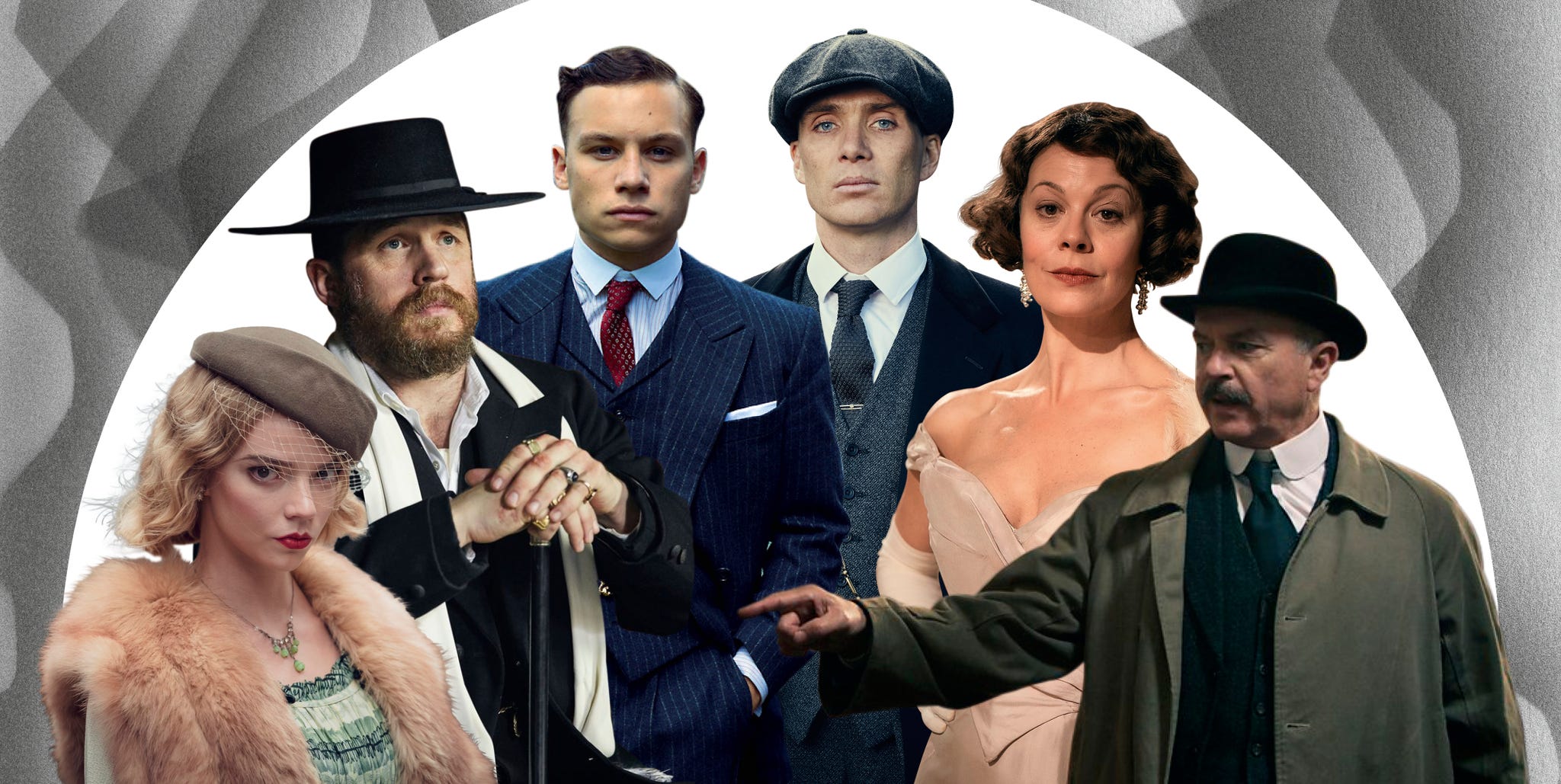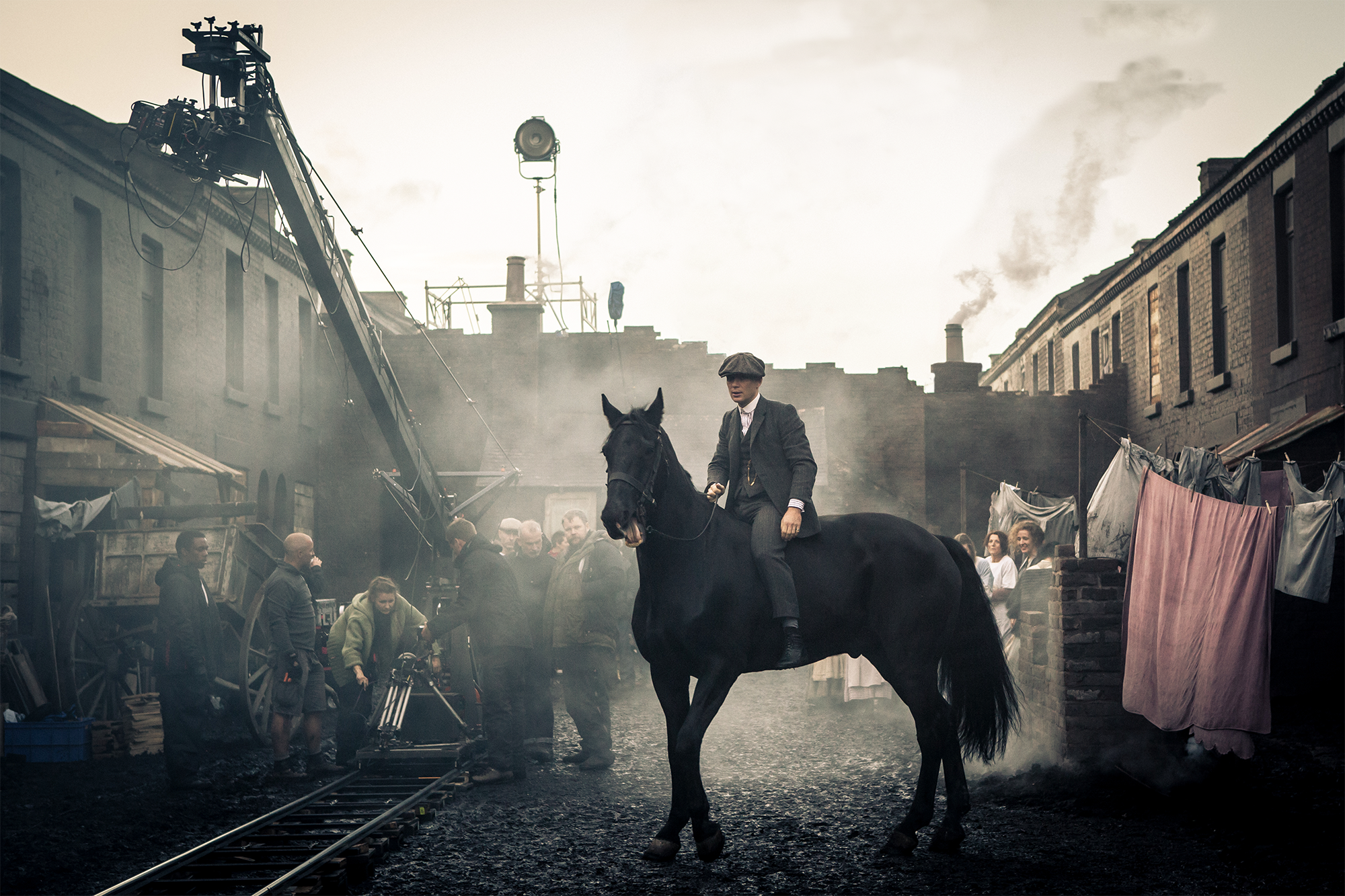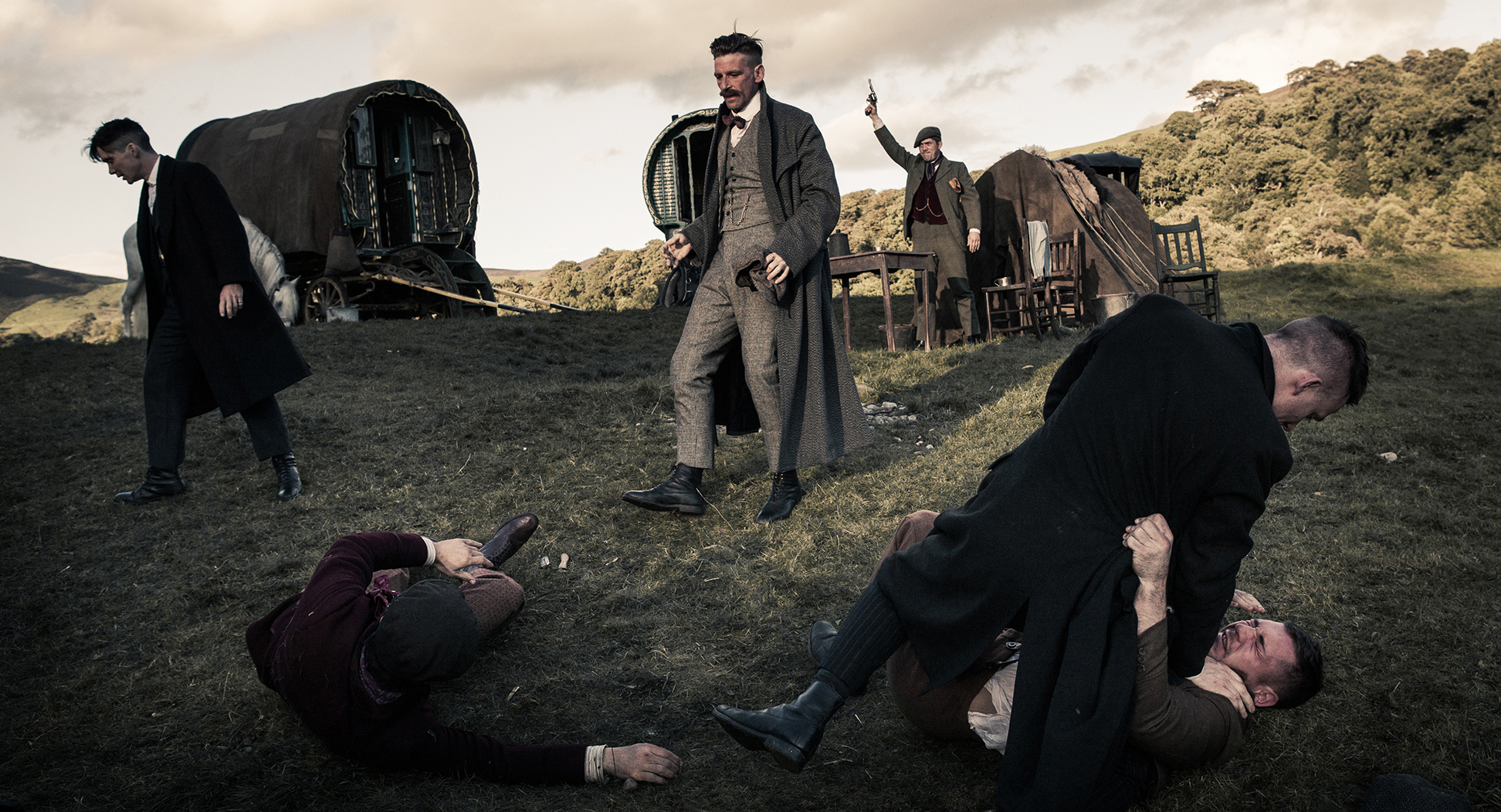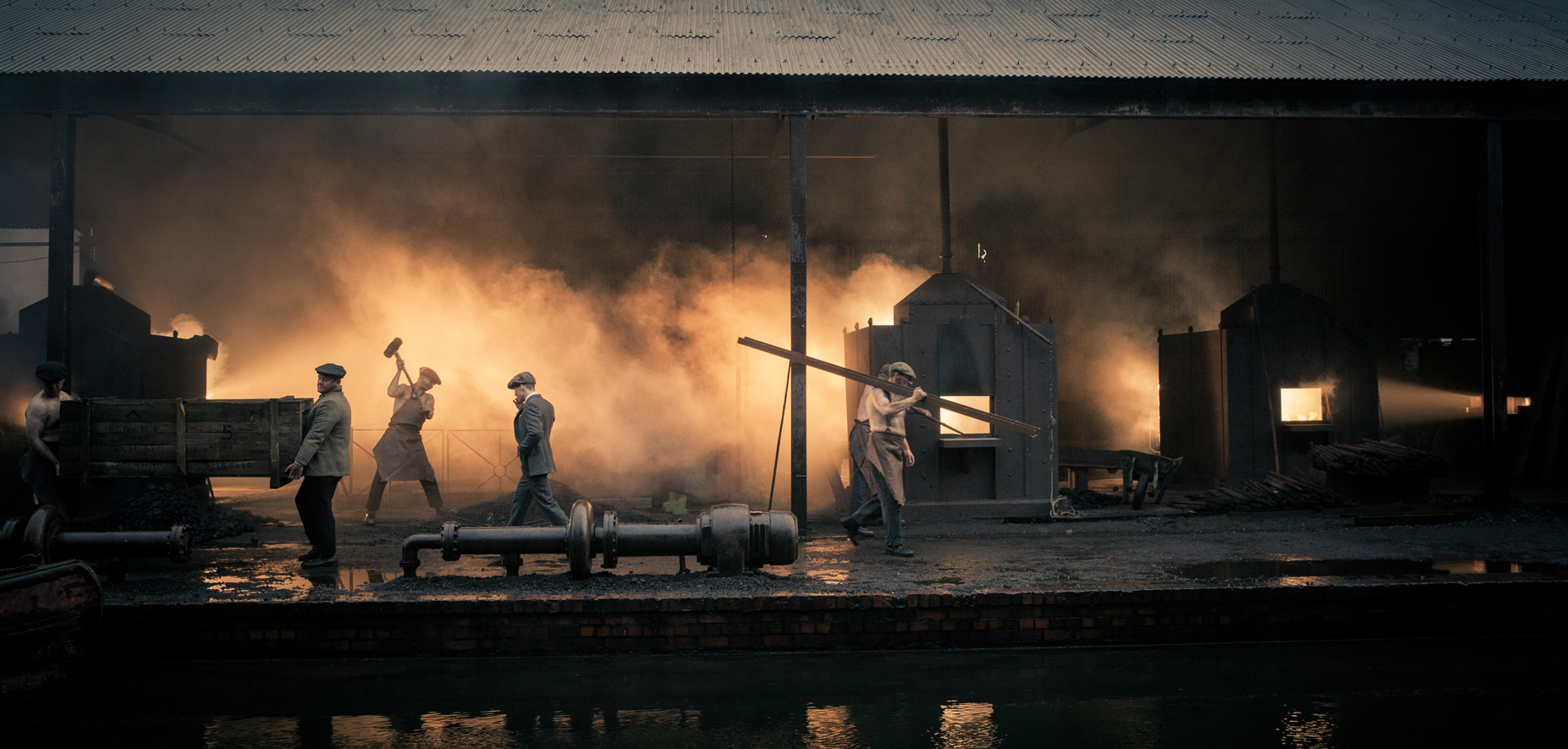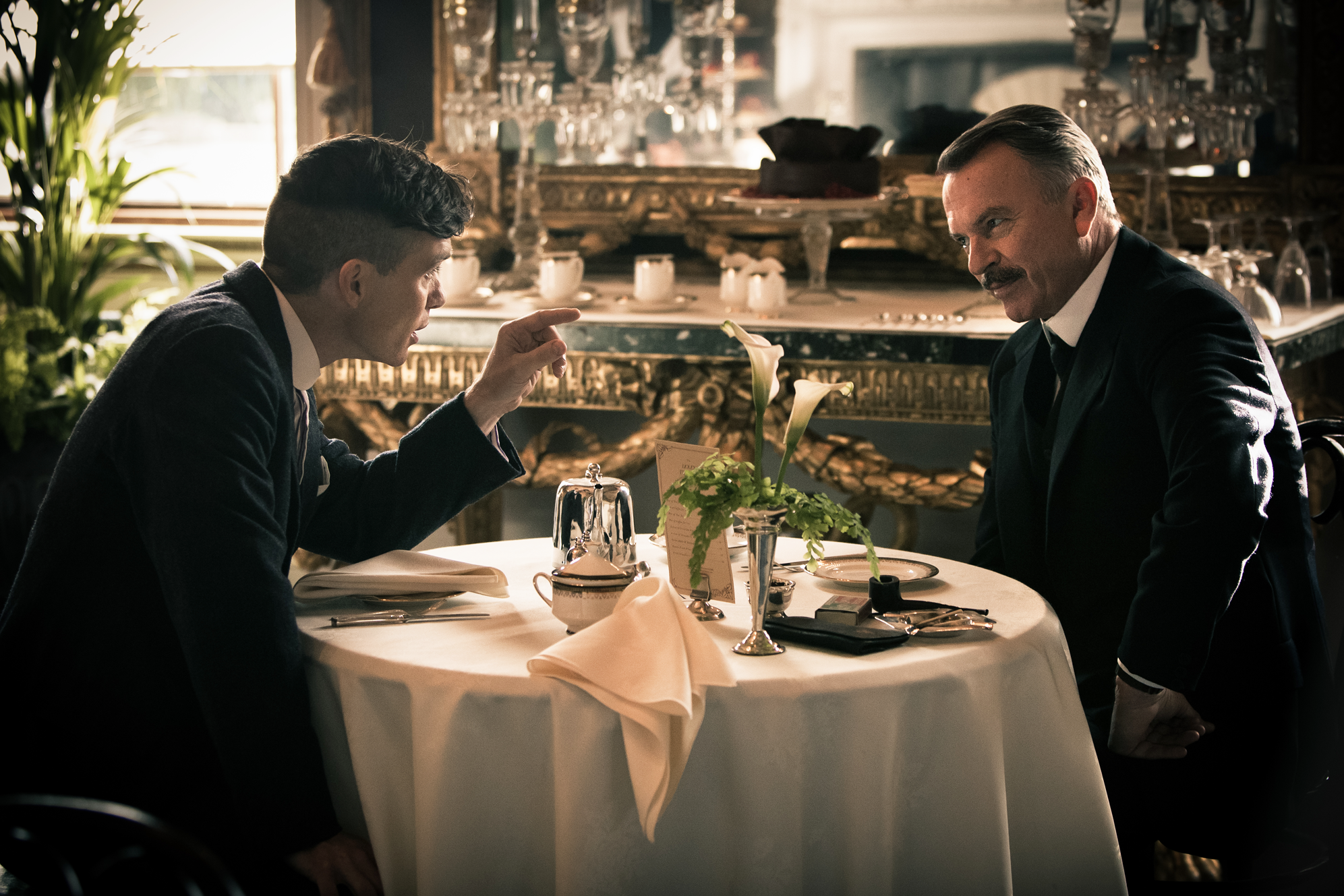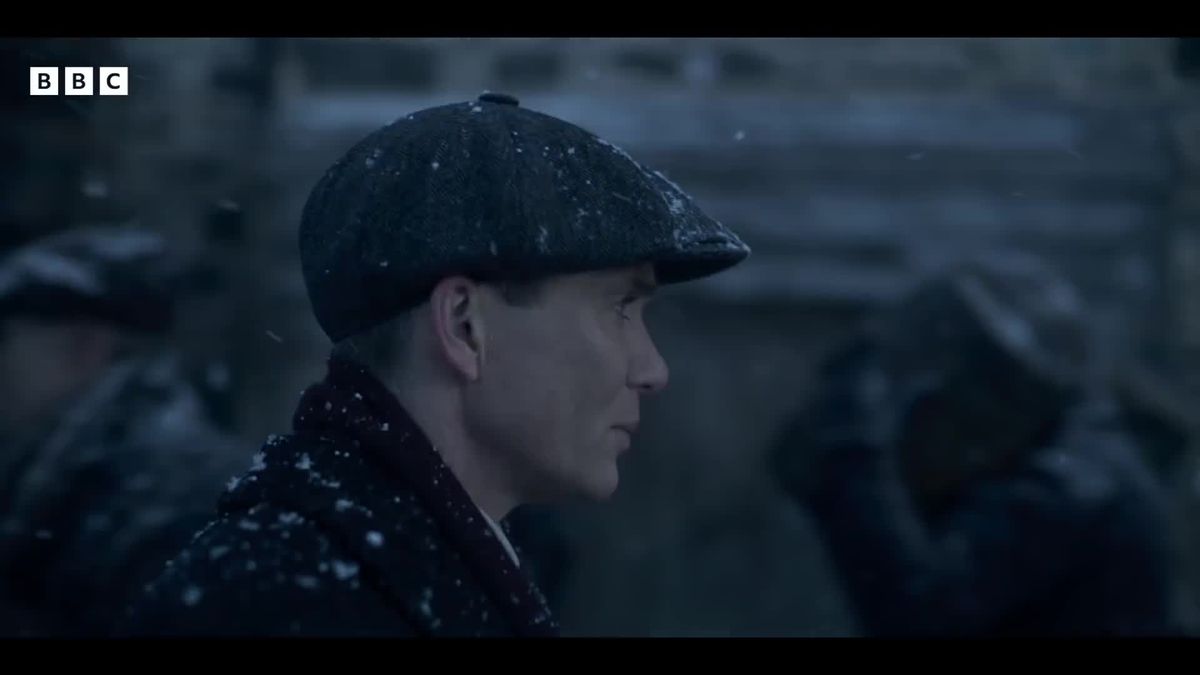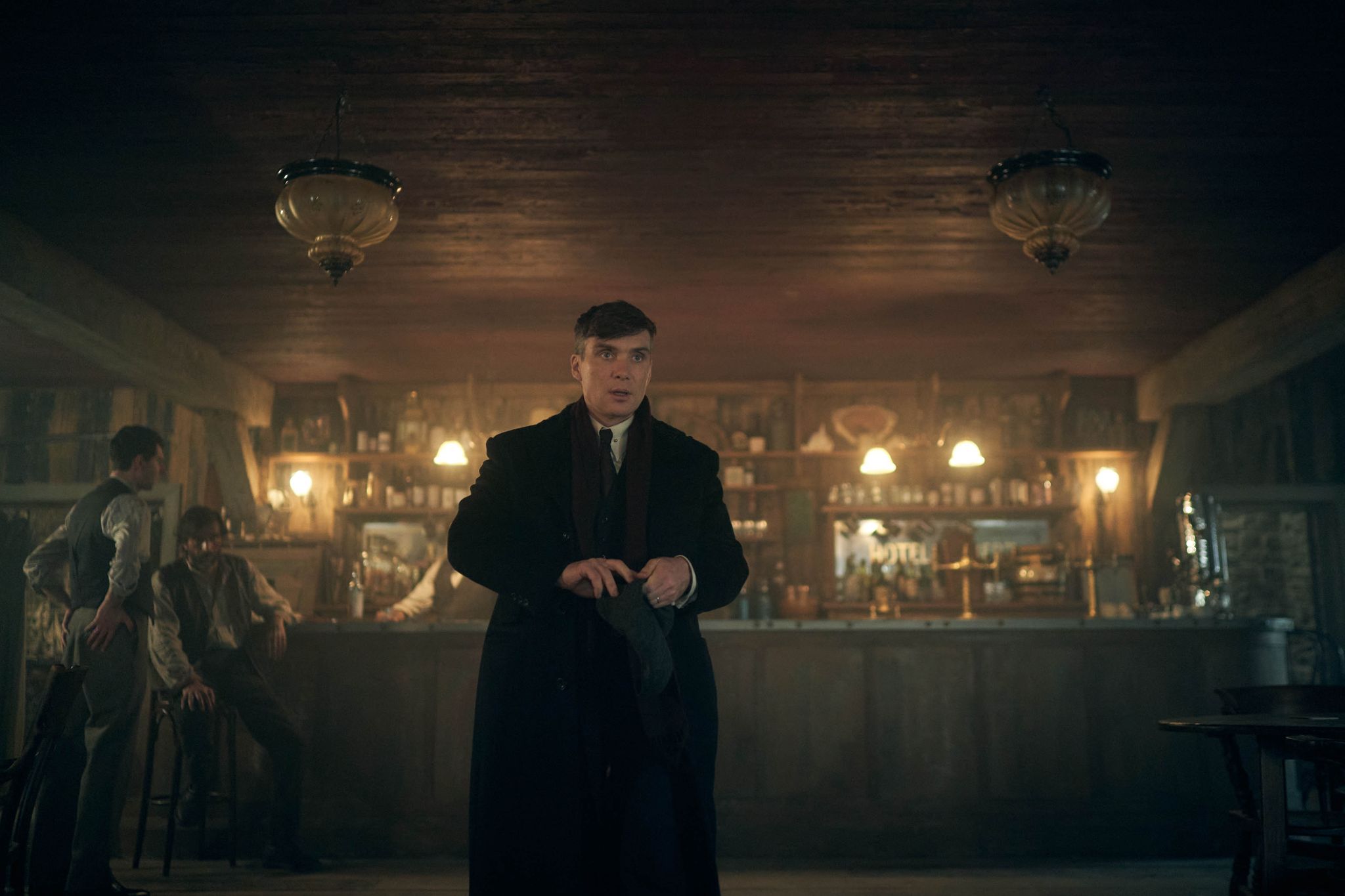When Tommy Shelby first rode his horse along Watery Lane in Small Heath, Birmingham, some didn’t know quite what to make of him.
The New York Times compared it to Boardwalk Empire. “But being British,” it said, “it’s less solemn and respectable than the American show. It has a more theatrical, artificial affect, somewhere between music hall and music video.” The Guardian found it “hard to take any threat made by Cillian Murphy as Thomas Shelby too personally when he is made up to look as if he's stepped straight out of a 1919 boy band”.
Now the final season of Peaky Blinders is almost here, and over the last nine years it’s morphed from a cultish BBC Two hit set in a city TV usually ignores into the kind of culture-warping show that makes you think of its effects as much as its story: the haircuts; the parties; the theme pubs; the roaming gangs of three-piece suit geezers; the two-day Legitimate Peaky Blinders Festival in Digbeth, headlined by Primal Scream.
Quite where the Right Honourable Tommy Shelby, Member of Parliament for Small Heath, and his family will end season six is still a closely guarded secret.
But this is the story of how they got there – and how Peaky Blinders turned from tall tales around a kitchen table in Birmingham into a global phenomenon – told by the people who made it happen.
"It Was Such a Natural Drama."
When Steven Knight was a child, his family would tell stories about a gang who ran the city of Birmingham in the early part of the 20th century, and a family called the Sheldons.
Steven Knight (writer and showrunner): The Birmingham that I knew when I was growing up was through my dad, because he was a blacksmith, and hung out with loads of gypsies and scrap metal dealers. And so I used to go with him shoeing horses, and I saw this side of Birmingham that was sort of the last of the Twenties and Thirties.
Jamie Glazebrook, producer S1-6: We were sitting in a coffee shop and he said, “I've got this thing, Peaky Blinders.”
SK: I was very young. My parents told me about my dad's uncles, who – in spite of what anybody may say about 'there were no Peaky Blinders after 19-whatever’ – were known in Small Heath as the Peaky Blinders.
JG: Our eyes sort of opened wide because we could tell then how formed it was in his head.
SK: My mum, when she was a kid, was a bookies' runner. She used to carry a basket of washing, and people would drop a bet with the coins and the name of the horse and their codename into the basket. And she'd then take it to the bookie. It was all illegal, and the police didn't arrest kids.
JG: This was sort of formed from stories that he had been told. And so there were very clear, almost photographic images that he could share.
SK: My dad told me a story about how he was given a message and he ran barefoot through the cobbled streets, and knocked on a door, and the door opened. And there's these men immaculately dressed with guns and razor blades and a table covered in money, and they're drinking whiskey out of jam jars. They'd got all that money but they wouldn't buy cups or glasses.
JG: He would talk a lot in the early days [about how] in America, people who worked with horses and cattle became cowboys who were mythologised, and we hadn’t done that. And so that's what he wanted to do.
SK: For me it was such a natural drama. And so I always kept that in my head. When I became a writer, I wanted to write it from quite early on.
Shaheen Baig, casting director: Tommy was the focus [of casting], for sure. We had lots of conversations about lots of people. We went all round the houses a little bit on it.
Cillian Murphy, plays Tommy Shelby: I'd been watching American TV shows like The Wire and thinking, those lucky actors getting to do those roles for so long. And I remember saying to my agent, is there any TV around? I didn't want to go to America to make television.
SB: I’m a huge fan of Cillian’s and never thought he’d do it, because up until then he’d only really done film. I knew it was an ambitious ask, but we just thought, why not?
CM: Within two days, my agent sent me the first few scripts of Peaky Blinders. So it was a combination of great agenting and serendipity, I think.
SK: In old newspapers you get stories of things that happen that do not fit what history tells you the world was like, and it's trying to get that chaos and oddness into the script that I think is important.
CM: I thought they were remarkable. I thought they were so original, so confident.
SK: We didn't ever do an audition or anything, but we [Cillian and I] had a meeting and we had a cup of tea.
SB: I remember it took a while to persuade everyone that Cillian was the right person. Once Cillian had read it, he was like ‘I really want to do this’.
SK: Immediately after Cillian texted me and said, “Remember, I'm an actor”. In other words, you know that nice, quite slight Irishman who’d come in for the cup of tea isn't what you're going to get.
SB: There were lots of actors it could have been, who would have been great, but it felt like getting Cillian was a real treat.
Sam Neill, played Inspector Chester Campbell: Three or four things arrived at the same time, and this particular one had the name Peaky Blinders. I thought, strange name. So I had a look at that first.
SK: Sam Neill contacted us, which was great.
SN: I really only got as far as the speech where Campbell comes in to tear shreds off the local constabulary, about their corruption in the filthy squalor that Birmingham is at the time. It was so graphic and so vivid, and so excessive. I called my agent and said, “I don't need to read anymore. I'm gonna do this.”
Sophie Rundle, plays Ada Shelby: Ada’s the original wild child, and I just thought it was really cool. But she felt very modern. And she felt very punk.
SB: I remember Paul Anderson’s audition so clearly. He came in like a whirlwind. [Broad Brummie accent] Ee spowk loike that from the get-go. It was so wild, it just made me laugh and I loved it because it was so infectious.
CM: We went to the Garrison pub, me and Steve, and a load of his Brummie mates. And we just drank Guinness all day. They were singing like Birmingham City songs and telling stories.
SK: It was a great introduction to that spirit of first of all telling stories – most of the stories were about criminal activity, to be honest. But also having a laugh. And then singing, which is a great tradition.
CM: I was recording them on my iPhone, just trying to get the accent in a kind of an authentic way.
SK: I’ve got lots of brothers and sisters. One of them became a blacksmith, and he was shoeing the horses at Stow Fair, and he knew some quite prominent gypsy family. And we took Cillian there and he learned to ride bareback.
Natasha O’Keeffe, plays Lizzie Shelby: There's lots of language that's sprinkled throughout his script that's witty – there’s a wit that comes with people who’ll be hanging out their doors, having a chat and smoking a cigarette while they're gossiping about whoever next door, and he brings that heart and soul into it.
SB: That was the first script I’d ever been sent, I think, that was set in the West Midlands. I never get sent scripts from where I’m from, so it isn’t an accent actors get asked to do very often. The accents would vary from Vic and Bob’s Slade At Home to Crossroads and back again.
“It’s a Period Drama for People Who Hate Period Dramas.”
With the series commissioned, the team began to piece together the Peaky Blinders’ world.
Sophie Rundle: I didn't realise quite how rock and roll it was. But looking back it really did have that energy from the beginning.
Frith Tiplady, producer: The music wasn't originally intrinsic to the script, but it was about wanting to be cool and aspirational – and swagger. And that word can get overused. But I don't think you normally see that in period working class storytelling.
Andy Morgan, location manager: We knew early on that the soundtrack was going to be different. So as we were driving round, myself and Otto [Bathurst, series one director], looking at locations, we had a CD on in my car: Nick Cave, and Arctic Monkeys, and White Stripes.
Cillian Murphy: Man, I'm all over it [the music selections] like a rash.
Jamie Glazebrook: Nick Cave talks about male experience very honestly, and beautifully, and in a raw way. And I think that's what Steve does as well.
CM: ‘Red Right Hand’ has become so synonymous with Peaky and it's a big number in his [Nick Cave’s] set now, you know. He's been really generous about it. I met him a couple of times and he's really funny about it. Nick Cave was the cornerstone, musically, for the show from the beginning.
JG: There’s an outlaw quality as well. It helps the feeling that this is all kind of an industrial Western.
FT: They wanted to give that American dream-like sheen to it: you know, everyone being good looking, which you don't always find in a period drama in the UK, and embracing that aspirational coolness.
SR: It’s like a period drama for people who hate period dramas.
FT: Trying to make sure that you had cinematic scale on a television budget was very hard.
Richard Frazer, VFX supervisor: I know that their references were things like Fritz Lang’s Metropolis and stuff like Blade Runner, as well as research of the industrial landscape of the time. He [Bathurst] wanted this stylised, hyperreal version of that.
Henry Badgett, VFX supervisor: He was asking for something that was historically informed, but bigger, more… just more.
RF: The scale of everything, you’ve got giant chimneys with fire belching out of them and warehouses that are really the size of skyscrapers.
HB: It was like an imagined version of Birmingham, with all of this industrial backdrop thing going on.
Grant Montgomery, production designer: When you look at photographs of Birmingham circa the 1900s, it feels like it's an extraordinary city. It's not the one you see now. It's grander; it feels like Vienna.
RF: We were putting in the gasometers, those giant structures that hold the gas and chimneys and warehouses at the back, again at quite ridiculous scales.
HB: The sort of scale that we hit in some of the backdrops was certainly unrealistic. But I think the point was that it puts the modern viewer in the same mind, maybe, as someone from the time was watching it go up, being similarly impressed with the scale and awed at the dirt and the noise and the hissing and the steam.
CM: Loz found this book of old criminals, Australian criminals from the Twenties. And they all had these brutal, fucking awful haircuts.
Loz Schiavo, hair and make-up designer: Cills definitely was unsure about the cut – I had to talk him around.
CM: We had to do a photo shoot, the three brothers, of us as soldiers. That was a very, very nice Twenties haircut – we were like, can we not keep these?
LS: I cut a straight 1900s haircut for him and told him that it looked normal, and that the show needed a strong look. Finally I went down a grade until it was what we wanted. Then I cut Joe Cole's hair and did the Peaky cut straight off. Cills saw everyone’s strong reaction, so he then said, “Let’s do it! Cut it.”
CM: I was wanting to make him [Tommy] physically imposing and so the more brutal the haircut was, the better it was for me.
Stephanie Collie, costume designer: [The aim] was just to try and make the guys as cool as possible. We were looking at Westerns, and the long coats and things like that.
FT: The other thing was the name. We had huge conversations about it. [Some said] It’s gobbledygook; people are just gonna go, what?
George Steel, cinematographer: I think I closed out my interview with, “Oh my god, you’ve got to change the title of this – Peaky Blinders? It’ll never catch on. That’s the worst title of anything I’ve ever heard.” Fuck knows why they gave me the job.
SC: You don't ever really see it in the programme, but we actually had the blades made – rubber ones – and every flat cap had one sewn in.
AM: We knew we had to find the street where they live.
GM: I had it in my head that the house had to be black – the smoky, soot-blacked houses.
AM: I remember it very clearly – turning the corner onto Powys Street in Toxteth and stopping and going, “This is it. I’ve got it.”
GM: I remember saying, “It's got to look like Heaven's Gate”.
GS: [Danish painter Vilhelm] Hammershøi was always in there, those empty frames and frames-through-frames. It’s not all John Ford.
SK: This is about working class history, which is a blank canvas on a blank canvas, because it's not really been dealt with in any terms other than either as broad comedy or tragedy. You know, 'Isn't it a shame?', and observing people as if they're a specimen. Whereas I grew up in a very working class community, and no one's feeling sorry for themselves, everything is glamorous. It's a dramatic life.
“I Don't Think Everyone Was Jumping Up and Down With Excitement.”
The first episode of Peaky Blinders went out on BBC Two 12 September 2013. From the first sequence of Tommy Shelby riding down Watery Lane on a horse, the first two seasons built up a cult following.
Sam Neill: I'd never done that accent before and I didn't grow up with that accent at all. So it was all new to me. But I've got a few friends who are from Northern Ireland – like Liam Neeson, for instance. I had a bit of a chat to him.
Natasha O’Keeffe, plays Lizzie Shelby: My resource was actually a friend of mine, who is from just down the road from Small Heath. She's 93, her name’s Joan, and she's a neighbour. She didn't know I was in Peaky Blinders and I never told her – it was actually her sons that asked who I was and stuff, and then they pissed themselves. They were like, “Sorry, what?”
Grant Montgomery: We built a facade at one end [of Powys Street] and the facade at the other so we had a complete 360 [degree set]. We painted it red brick and then we painted it black to give it that look. That was fantastic that gave us our scale.
George Steel: We actually spent all our special equipments budget on the first shot, with the horse and the Russian arm [a crane camera mounted on a car]. Otto was adamant that we shoot it all as one shot and the only way that we could really do it was on a Russian arm, which is £10,000 a day.
Andy Morgan: The budget for Peaky had pretty much been spent halfway through the series.
GS: After that we ended up with very rudimentary equipment, which is why a lot of it looks the way it looks. It has that slightly old fashioned feel, because we didn’t have the money to whizz around on technocranes and stuff.
SN: All those houses were deserted. Ringo Starr was born in the next street just behind. His little yard would have backed onto the Peakies' house.
Sophie Rundle: When we were filming, I remember halfway through they projected onto this huge screen in this old hangar that we were filming in. They showed us some of the stuff we've been shooting, and everyone was like, “Oh – that’s really fucking cool.”
Cillian Murphy: But when we did it, I don't think everyone was jumping up and down with excitement at the first series.
SN: Steven called me and said, “Sam, we are doing a second season and I've pretty much finished writing it. The good news is we are doing it; the bad news is you will die.”
CM: We got the second commissioned and then it sort of got legs, then, I think in terms of the fan base, or people really loving the show. And the whole Peaky world of Peaky parties and Peaky weddings and Peaky... all of that, that stuff started really quickly.
GM: The second series I did go to The Godfather. If you see the width and the position of the desk, all of that is actually taken from The Godfather.
Fin Cole, plays Michael Shelby: The moment that I got the call, I remember I was at college, I was studying my A levels. I couldn't tell any of my mates and I was supposed to be giving a lift home to a couple of them. And they're by my mum's car, and I was standing there. And I just froze and I was speechless. And I just sort of saw, you know, life kind of click into place a little bit, and start to make a bit of sense all in this one moment. I was shaking the whole way home.
Shaheen Baig: With Tom Hardy, that was amazing luck. I think he was supposed to do a project that maybe got delayed, and his agent rang and was talking to me about Tom’s availability and I was like, hmm – we might have something.
CM: Tom Hardy’s just a tremendous actor. That character [Alfie Solomon], he brought it in fully fucking formed. It was completely there: the voice, the hat, everything. And why I think it works, it's such a lovely contrast or companion or sort of negative and positive of Tommy, because he's [Alfie's] all this energy fizzing and Tommy's this stillness.
AM: When the script came in [for the finale of season two], and it said, we're at the races, me and Grant were like, “There's no way we're filming at a racecourse.” We can’t afford it. So we suggested, ‘What if the whole scene was done like in Goodfellas, when Henry Hill goes through the kitchen?’ That's exactly the reference that Otto used.
FC: I remember Colm [McCarthy, season two director] saying in the early days that Michael was almost like a young Tommy. Tommy saw himself in Michael, the difference being that he didn't fight in the war. But apart from that, he had a lot of the ability and know-how to be as successful as Tommy.
CM: I have a bit of a man crush on Sam Neill.
SN: I spent a lot of time on the last series in Manchester in these serviced departments that were full of business people during the week, and then really, really dangerous hen parties on the weekend. Oh my god – honestly, you'd be scared to go on the street.
CM: He's one of the most gorgeous, lovely, funny, dry men who's managed to have this beautiful career where he just makes amazing wine and plays amazing parts. Like, it's the dream situation to be in for any actor, so I found it really difficult to hate him.
SN: There was a Tesco down on the corner, and I'd make a run for it to get a bottle of wine. In all those supermarkets there's something which I call the sad aisle – the one with its meals for one, and you see these people getting meals for one and everyone's so ashamed to be in the sad aisle. No one can look at each other, no one could catch each other's eye – it's the loneliest supermarket aisle of all and they're everywhere. But it seemed to be the saddest of all were the ones in Manchester. Fucking hell.
CM: I wish we [Tommy and Campbell] could have been, like, buddies.
SN: Did I think Campbell might come back? Oh no, it's terminal. Polly shot him twice. Once in the balls, once in the stomach. There's no point coming back with only half your guts and no bollocks.
“How Has This Happened?”
By the time the third season landed in 2017, Peaky Blinders had amassed a growing audience of hardcore fans. Over the next three seasons it would explode into a mini-industry in its own right: Peaky Blinders bars, parties, merchandise, clothing lines, haircuts.
Steven Knight: I think the biggest shock for me was when I got a call from Snoop Dogg. And he said he's in London, he wants to talk about Peaky Blinders. Now, it's not somebody who I would have thought has an instant connection to Birmingham in the Twenties. But I met him and we sat together for three hours and talked about it, and he was saying it had become very popular in south central parts of New York and Hispanic communities. I thought, how has this happened?
Sophie Rundle: I remember sitting in a pub and it was late afternoon, it was quite quiet. And in walked – no word of a lie – about 40 men dressed as Peaky Blinders on a stag do. They walked straight past, absolutely no idea I was in the show. I should’ve bought the groom a drink.
SK: I’ve been in a couple of Peaky Blinders bars. They were alright.
Natasha O’Keeffe: A funny one was seeing the Porky Blinders hotdog stand on the high street in Manchester.
SR: I know it's really bad but I really quite like the bootleg unofficial bar with ‘Peaky Blinders’ or some weird merchandising – like, no one signed off on that. But that's when you realise oh, it really is a thing. It's got its own momentum now.
Jamie Glazebrook: Someone had a tattoo on their back, and I think there was Walter White on one side and Tommy Shelby on the other side.
Loz Schiavo: I started hearing that people were asking for a Peaky cut in salons, then I started seeing them in the street. Then when the cut went global that’s when I thought, ‘There’s something in this’.
Cillian Murphy: God, the amount of people that took the piss out of me and mocked me for that. And then it's like, on the cover of fucking magazines. It's the chicest haircut you could have!
LS: It's edgy, cool and different. But also, seeing the cuts on the Shelby boys – who wouldn’t want to look like Tommy and Arthur?
Tim Mielants, season three director: I remember in the editing room all the execs were watching like, Jesus Christ this is totally different. They were slightly anxious about it, like is this the same show?
CM: I suppose [one key scene for Tommy is] when John got killed – when it became that they weren't invincible. Tommy does feel shit; it does hurt him, he is fallible.
TM: [Season three is about how] it’s lonely at the top. Citizen Kane was a reference at certain times on close-ups and more symmetrical framing.
Frith Tiplady: We didn't get nominated for a Bafta [for season three]. It's things like that where you sort of go, oh, it's not really breaking through.
TM: It’s really the acting – the magic between the characters – is the gold for me in that season.
David Caffrey, season four director: When I saw the scripts, I was probably just a bit nervous about how credible you could make them. On paper, they were great twists and turns and all, and then you just worry that certain twists could be signposted, or there'll be a groan factor or something like that.
Anthony Byrne, season five director: Season four felt like the season that everybody wanted: it was proper gangsters, Italian gangsters and the Shelbys, and there was lots of shooting and running and chasing, and lots of music.
DC: Season four was just consistently on the move.
SR: The men have been traumatised and the women were left to pick up the pieces. And then the world starts shifting, and that's where you see real change. And for someone like Ada, who is so thoroughly not of the old world, that's where you start to see people shift. She rejects the idea that she has to stay at home. She wants to make her own rules.
DC: We had a visit from Gary Neville and Ryan Giggs. I remember, I was flanked either side of me [by] these titans of British sport who won the Treble, watching the monitor as Arthur was getting strangled in the changing room of the big fight.
NO’K: I think people had started to binge-watch the series, come about series three or four, and there was then a real snowball effect.
DC: When Jose Mourinho was supposed to come down to the set, it was gonna be the day where we had the big gun. I don't do Instagram or any of that stuff, but if I were to do Instagram, getting Mourinho to fire that gun in slow motion – the amount of memes and everything that would work off the back of that.
CM: The success of the show, or the zeitgeistiness of the show, never really affected how we approached it. And in fact, it probably gave it a little more confidence in how we wanted to tell the story. Like, probably for Steve that he could go darker and deeper, because he knew that the audience were with him.
DC: The two guys pretty much improvised [Tommy and Alfie’s shootout on the beach]. In terms of the dialogue, it was pretty much as was but in terms of the action, that was very much Tom and Cilian had a certain way they were going to go about it – they’d both fire and they’d both fall over. That was their idea.
AB: Tom Hardy essentially just refused to die. And I wanted to have more of him in it.
CM: They're always events when Tom [Hardy] comes along on set, and then Steve just writes this delicious dialogue.
TM: He’s amazing – like a cannonball of excitement and energy.
AB: That scene [in Alfie’s flat in Margate], I always said it was like a little Beckett play because it's so weird. In the middle of an episode of Peaky, it was like Waiting for Godot or Endgame type thing.
TM: I’m going to be totally honest with you, I stopped watching [after season three] – I put so much work into it, I put my soul and everything into it. Watching it again is like watching your girlfriend with another dude.
The first three seasons averaged a little under three million viewers; season four got more than four million. After a jump to BBC One, the climax of season five in 2019 peaked at 7.3 million viewers. A cliffhanger ending saw Tommy Shelby appearing to attempt to kill himself.
AB: Tommy was somebody who was on the edge of oblivion. So it was never real for me – I mean, he's stepping into a foggy, misty field, he's seeing the ghost of his dead wife, there's the ghost of a black horse. And we were going to put the effigy of the crucifix there but I was like, that's too much.
SK: In series five, Polly joins that group saying, I'm not scared of death. I think once people are in that position, death becomes less relevant because if you're already dead, you have absolute power. And that's what I wanted to always say.
AB: I didn't have a take on it, I shot it like he's going to do it – you have to. Cillian did it like he's going to do it.
N’OK: In each series there's a little shift in gear which puts Lizzie in a different place within the Shelby clan.
SR: Ada has changed a lot from that kid in the first series. But that kind of punk energy has stayed the whole time.
AB: There was a moment where I went, if we never get to make it, again, for whatever reason, that that would be a kind of great ending for Peaky Blinders: a man on the edge, and you don't know.
JG: Steve was a bit like Tommy Shelby: let's just keep on going and see how far he can get. And we managed to get all the way.
AB: It's cowboys and Indians, basically, and they [the Shelby clan] are the Indians. It was a Western, shot like a graphic novel.
JG: It's an emotional roller coaster and it hits you on quite a visceral and corporeal level.
AB: I was curious to know what happened after this moment [at the end of season five], because nobody knew – Cillian didn't know, none of us knew when we shot it. And then when I was editing, Steve sent me a very early draft of the script for episode one of the new season – way before season five was broadcast. He sent it saying, “this will make you stay”.
FT: Suddenly you've got a gala screening in Birmingham as you launch, and the streets are lined and people are shouting. That doesn't happen in telly.
“Peaky Just Said, ‘Fuck That’.”
The final series of Peaky Blinders arrives in February 2022, with the promise of a film and possible spin-offs to continue the saga. But season six was made in the shadow of the death of Helen McCrory.
Cillian Murphy: The whole series was really hard [without Helen McCrory]. It was a huge absence. It's not the same show without her. We dedicated the show to her, her presence is very much part of the storyline of it. But she was kind of the heart of the thing. And I adored her, you know, she was magnificent. Magnificent person and a magnificent actor.
Loz Schiavo: I miss Helen everyday. Helen taught me to be strong, and not to be scared, to be authentic. She had a sense of love and equality towards everyone.
CM: She could do power and she could do vulnerability, like, in a turn. That's remarkable to be able to do both of those. Some people can do power brilliantly and vulnerability brilliantly, but it's remarkable that you get both.
Anthony Byrne: One of the last things Polly says – I went back and watched the episodes and I took it out, and I said, this is the mantra for season six: “If you do this, there will be a war and one of you will die. I don't know which one it will be.”
Sophie Rundle: We were all in on the last day, which was quite nice – to all be in a group scene on the last day.
AB: Episode six is pretty much a feature episode. It's 80 minutes.
Steven Knight: In series six we're bringing in the new generation, and they are going to be part of what happens in film. I think it's finding those actors that you just watch and you think, there you go. There's the future.
AB: Once Upon a Time in America was something that we talked about a lot for season six. When I was talking to Cillian about it, the thing that I kept saying is that it's Gothic – particularly season six.
CM: Tommy and Alfie are enemies at the beginning, but then they've begun to sort of work together. And you'll see in series six, it becomes very interesting.
Fin Cole: It’s impossible to comprehend. I've been to some of the most random places in America and random parts of the UK, and people have come up to me and said how much they love the show. People have written to me and said what the show's done for them in different parts of their lives. And that's something that only few actors and creators and artists get to experience.
Grant Montgomery: It's not safe. It was never meant to be safe. It's like a hand grenade to period drama.
SR: As Brits, we're a bit more apologetic, and I think Peaky just said, “Fuck that – this is amazing! Birmingham is amazing! This is a British story and it's really cool and rock and roll!”
SK: Americans write songs about their hometown: Chicago and Abilene and Tulsa and all of that. Whereas we can't write songs about Huddersfield and Bolton, and things because it's sort of funny. But it sort of isn't as well you know. We should be able to reclaim our history and mythologising.
SR: I feel quite nostalgic for it already.
SK: The film, I know exactly what it's about. And I know what two stories it's going to tell. How the story will unfold, I don't know. What will happen after that, I want that to depend on the film. For all we know somebody is going to pop out – I think I know who it's going to be.
CM: Tommy will never be satisfied. I don't know what’s in store for him. But I think he will never rest.
